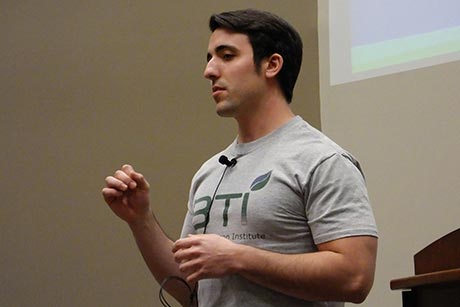Scientists explain their work quickly, in plain English
By Patricia Waldron

It takes the average graduate student about six years to complete a science Ph.D., but contestants in the Flash Science! competition told the audience all about their work – in just three minutes.
At Boyce Thompson Institute (BTI) on May 5, 15 graduate students and postdoctoral researchers used their wittiest words and most apt analogies to describe their plant research to a general audience.
Joshua Baccile, a graduate student in the field of chemistry and chemical biology, working with BTI associate professor Frank C. Schroeder, won the event with his talk, “Discovering the chemical toolbox of infectious mold.” Postdoctoral researcher Allyson MacLean, working with BTI professor Maria Harrison, was runner-up for her speech on the symbiotic relationship between plant roots and fungi, “The 400 million-year-old marriage.”
BTI Professor Emeritus Robert Kohut spearheaded the contest after reading about the Three Minute Thesis activity founded by the University of Queensland. In this competition, students from departments across the university compete for travel funds by giving short explanations of their work. Kohut thought a similar competition at BTI would give early-career scientists an opportunity to communicate with the general public and practice their “elevator speech.”
“I’ve always thought this was a skill that every scientist should have,” said Kohut. “You’ve got be able to explain your research in a way that laypeople understand what you’re doing, why you’re doing it and how the outcome may be of interest to them.”
Kohut, fellow BTI faculty member professor Greg Martin and others also gave their support. First prize came with a $500 award; the runner-up received $200.
“At only three minutes for $500, that’s $10,000 an hour! Not too shabby,” laughed Kohut.
A panel of judges, composed of scientists and nonscientific staff, judged the presenters.
Announcing the winners, BTI President David Stern remarked, “When you’re stuck in that proverbial elevator and someone asks what you do, don’t say, ‘Ugh, it’s too complicated!’ Science communication should be in every scientist’s toolkit.”
Runner-up MacLean said she decided to participate to practice her communication skills. Earlier in her career, she had given a radio interview to the Canadian Broadcasting Corp. and found it very difficult to give answers that a general audience could understand.
“It’s so easy to use the technical jargon, and it’s much harder to speak in simple English,” she said.
MacLean hopes that the contest will continue in future years. Many audience members and participants echoed the sentiment.
Kohut himself amassed much experience talking with nonscientists. He spent much of his career advising the Environmental Protection Agency and the National Park Service on questions of air pollution and vegetation and gave expert testimony to Washington state on the effects of a proposed coal-fired power plant on native plants.
“I think it’s a part of being a scientist,” said Kohut. “If you can only speak to other scientists about what might be an esoteric thing you’re doing, then I don’t think you fulfill the full scope of what scientists are obligated to do.”
Patricia Waldron is the staff science writer for the Boyce Thompson Institute.
Media Contact
Get Cornell news delivered right to your inbox.
Subscribe